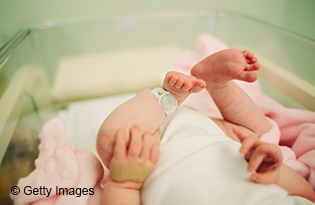Why newborn screenings are important
2/10/2025 by Klara Milojkovic, M.D.

If you are expecting a baby, you're probably already thinking about how to keep them healthy. An essential part of their health is newborn screenings, which include simple tests that check for rare but treatable health conditions. These appointments include blood, hearing and heart screenings.
Why should my baby be tested?
Your baby can be born with a health condition but may not initially show any signs of the problem. If a health condition is found early with newborn screening, it often can be treated. Early treatment is vital because it can help prevent more serious health problems for your baby. The newborn screenings make sure that your baby stays safe and healthy.
When will my baby be tested?
Newborn screenings are usually done when your baby is one or two days old. If your baby is born in a hospital, the screenings are done before you go home. If you plan to deliver at home or in a birthing center, your baby’s clinician can help you schedule the screenings.
What are the three newborn screening tests?
Blood spot screening: This test can detect genetic, metabolic or hormone-related health conditions. For this test, a quick prick of your baby’s heel is used to sample blood. The blood drops are collected on a special paper and sent for testing. Results are usually back by the time your baby is about seven days old.
Hearing screening: For the hearing screening, the medical team will use tiny earphones and special software to check how your baby responds to sound. Your baby needs a hearing test because hearing loss can affect speech and overall development.
Heart screening: Heart screening, also known as the Critical Congenital Heart Disease (CCHD) screening, ensures that your baby has a healthy heart. For this screen, sensors called pulse oximeters are placed like stickers on your baby’s hand and foot, and they measure the amount of oxygen in the blood. This test helps detect any babies who may have heart problems.
What if the newborn screening results are not normal?
Most newborn screening test results are normal. However, if your baby’s screening results are abnormal, they need more testing. Your baby’s clinician will recommend another kind of test, called a diagnostic test, to see if there is a health condition. If the diagnostic test results are normal, no more testing is needed. If the diagnostic test results are not normal, then your baby’s clinician will guide you on the next steps for your baby, which may include interventions, medications or diet modifications.
Klara Milojkovic, M.D., is a Pediatric and Adolescent Medicine resident in Rochester, Minnesota. She is currently applying for a fellowship in Neonatal-Perinatal Medicine.
